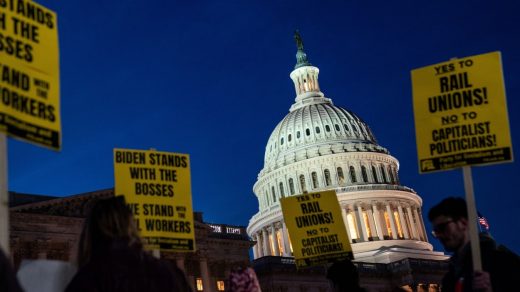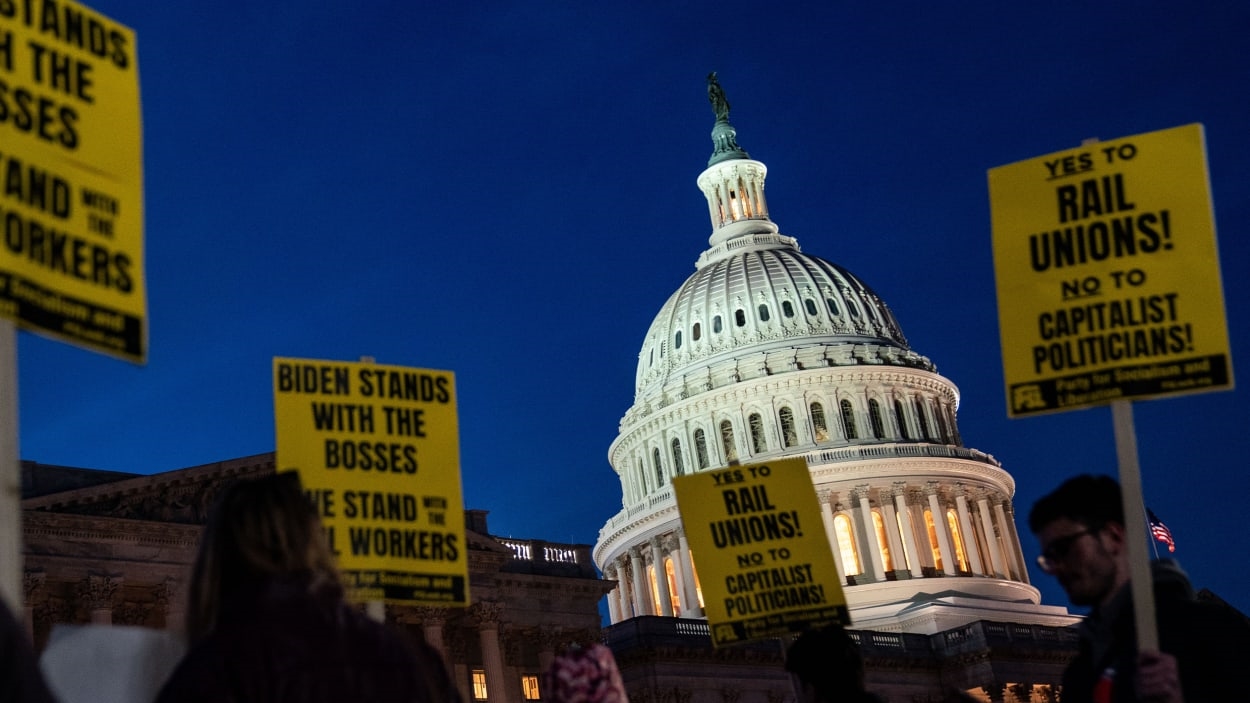Railroad strike: What’s next after the House intervened?
Updated December 1, 2022: On Thursday afternoon, the Senate passed the tentative agreement, but failed to pass the provision that included sick leave. It will now go to President Biden’s desk.
For more than two years, railroad workers have been trying to negotiate a new contract with their companies, asking chiefly for paid sick leave and changes to a scheduling system they say has forced them to work while sick and which leaves little room for a life outside of the railroad.
Tensions have risen in recent months, leading President Joe Biden to help broker a tentative agreement in September between the leaders of the 12 rail worker unions and the rail companies. That agreement covered 150,000 employees—but when rail workers in four of those unions rejected that agreement, it sent the whole process back to the bargaining table—also opening the possibility for a rail strike as soon as December 9.
On Wednesday, House lawmakers passed a bill to avert such a rail strike. The vote came just days after President Biden called on Congress to pass legislation immediately to end the dispute and adopt the tentative agreement union leaders had previously agreed on.
In his call to Congress on Monday, Biden pushed for the body to adopt that tentative agreement “without any modifications or delay—to avert a potentially crippling national rail shutdown.” Stopping rail service could cost the U.S. economy $2 billion per day, per the Association of American Railroads, which represents the freight industry. Across the U.S, 30% of all goods move by rail, and often those goods (including coal, ethanol, and other commodities) can’t be transported by other means.
Now, the bill to avert a rail strike will go to the Senate for a vote before landing on the president’s desk. Here’s what you need to know about the bill, and what rail workers are fighting for.
Why are rail workers ready to strike?
For years, rail workers have been trying to negotiate a new contract deal, asking chiefly for paid sick leave (they currently have none) and changes to scheduling. Rail workers say they’ve been forced to work while tired and sick, have been unable to schedule doctor appointments, and have had to miss funerals for loved ones because they didn’t have enough “points” (part of the railroad industry’s attendance policy).
Taking time off costs points, and workers can only earn back points if they essentially make themselves available on call 24/7, says Art Wheaton, director of labor studies at the Cornell University School of Industrial and Labor Relations. Over 14 days, he explains, workers must be ready to respond to a call within 90 minutes, which often means sitting in a hotel room by a phone, unable to go to appointments or be with their families, all while not being paid.
In September, with help from the Biden administration, rail unions and railroad companies reached a tentative deal—which averted a rail strike ahead of the midterms—that included a 24% pay increase by 2023 and a single paid day off. While 8 of the 12 U.S. rail worker unions ratified the agreement, 4 rejected it, putting a strike back on the table. “If any one of the 12 unions goes on strike, the other 11 will join the strike with them,” Wheaton says. “They won’t cross the picket line.”
The labor dispute “appears to be a huge game of chicken,” Wheaton adds, “where you have the railway unions and the railway companies speeding at each other at 100 miles an hour with a potential strike on December 9.”
How can Congress stop a labor strike?
Rail workers operate under a different labor law than other workers: the Railway Labor Act, which was enacted in 1926, nine years before the passage of the National Labor Relations Act. The Railway Labor Act covers both railways and airlines as “critical infrastructure,” Wheaton says, and gives Congress the ability to intervene in labor disputes. The act is meant to “avoid any interruption of interstate commerce” by allowing for congressional action, like averting a strike and pushing a tentative agreement forward; Congress can also add (or remove) any provisions from such agreements. Wheaton says Congress has taken this action 16 times in the past, most recently under President George H.W. Bush in 1992, which ended a two-day rail strike.
At this point in the labor dispute, there’s nothing Biden can do to avoid a strike, but Congress can pass a law to do so—in “any way they want,” Wheaton says, either by passing the president’s tentative deal or adding their own changes to it.
On Tuesday, a group of representatives, including Ayanna Pressley, Jamaal Bowman, Cori Bush, Chuy Garcia, Alexandria Ocasio-Cortez, Rashia Tlaib, and Ilhan Omar introduced an amendment to the House bill that would increase paid sick leave protections for rail workers. “Providing our rail workers the paid sick leave they demand, deserve, and require is critical to a just recovery and to our work to affirm healthcare as the fundamental human right that it is, Pressley said in a statement released Wednesday morning ahead of the House vote.
That provision also passed on Wednesday and would increase the number of paid sick days for rail workers from one (as given in the tentative agreement) to seven, if it also passes in the Senate. But the provision is structured in such a way that when the vote goes to the Senate, lawmakers could choose to pass only the tentative rail agreement without the additional paid sick leave.
Ahead of the vote, Wheaton said that changes to the bill, including provisions like more sick leave, could mean it has a tougher time getting through the Senate. However, some Republicans, including Senator Marco Rubio, did say that they would consider adding paid sick leave to the contract. “I will not vote for any deal that does not have the support of the rail workers,” Rubio said in a statement on Tuesday. Timing is also crucial here: Officials are hoping to avoid a rail strike not only before the holidays, but before a new Congress is in place in January, which could have a more difficult time passing a law to end the strike.
What’s next for rail workers?
If the Senate passes the bill and Biden signs it, that means rail workers will no longer be able to strike on this contract, and the tentative agreement is put in place. But it wouldn’t solve their labor issues, many say. The Brotherhood of Maintenance of Way Employees, one of the rail unions that represents nearly 26,000 workers, said in a statement on Tuesday that it will continue fighting for paid sick days.
“Passing legislation to adopt tentative agreements that exclude paid sick leave for railroad workers will not address rail service issues,” the statement continued. Rather, it will worsen supply chain issues and further sicken, infuriate, and disenfranchise railroad workers as they continue shouldering the burdens of the railroads’ mismanagement. . . . President Biden, Congress and the railroads need to know that this problem is not going away soon.”
Wheaton says the tentative agreement isn’t a total loss for workers, since it includes raises, but he adds that the fight is “not about money,” as that issue was settled almost immediately in negotiations. “This is about the railways, which spent years trying to get rid of as many employees as they could so that they could increase their profits,” he says. According to the Surface Transportation Board, a federal regulatory agency, freight carriers have 30% fewer employees today compared to six years ago. “And now they don’t want to hire more people back to allow flexibility for people to take sick time off, and they’re running into issues, and will continue to run into issues hiring new workers, because no one wants to get a job where they can’t take off a sick day, they can’t go to the doctor, they can’t go to their mother’s funeral.”
That last example isn’t a hypothetical: Wheaton says workers have been fired for going to their mother’s funerals. He says workers have died on trains, too, because they couldn’t get a doctor’s appointment. “Currently, they have a horrible, awful, terrible, unfair, unethical attendance policy,” he says—one that wasn’t negotiated at the bargaining table but imposed by the railways.
Along with running into issues hiring new workers because of these conditions, Wheaton says the railways may lose current workers, too, if they may opt to retire and get their pensions because they’re tired of being overworked and missing their families.
Biden’s call on Congress to avert the strike may also change his labor reputation, at a time when public approval for unions is the highest it’s been since 1965. Biden has frequently praised unions, but Railroad Workers United called this move a “legacy defining moment” for the president. “He is going down as one of the biggest disappointments in labor history,” the union wrote on Twitter.
(14)



